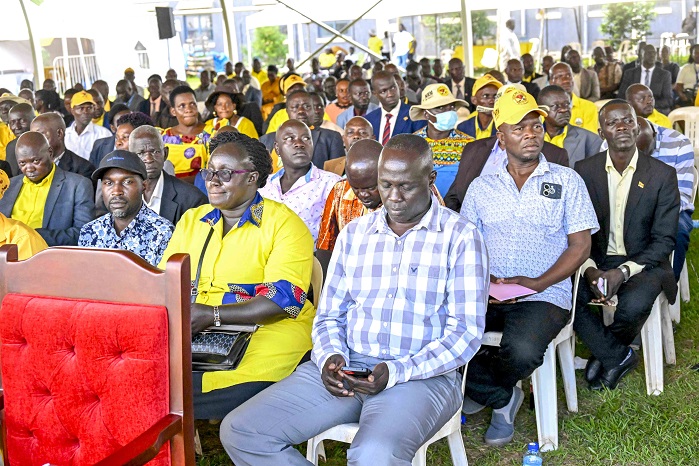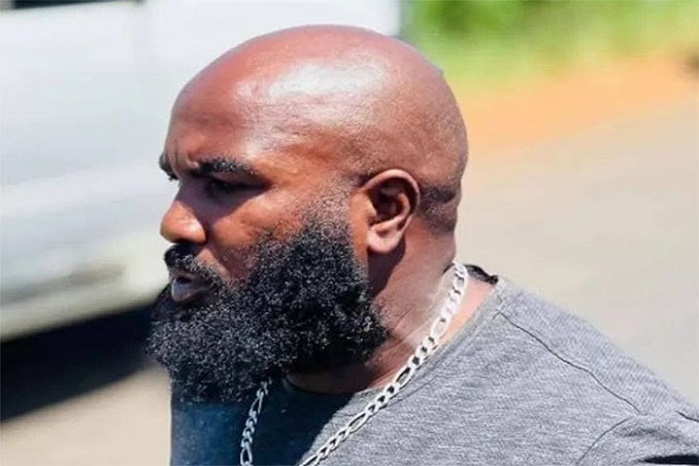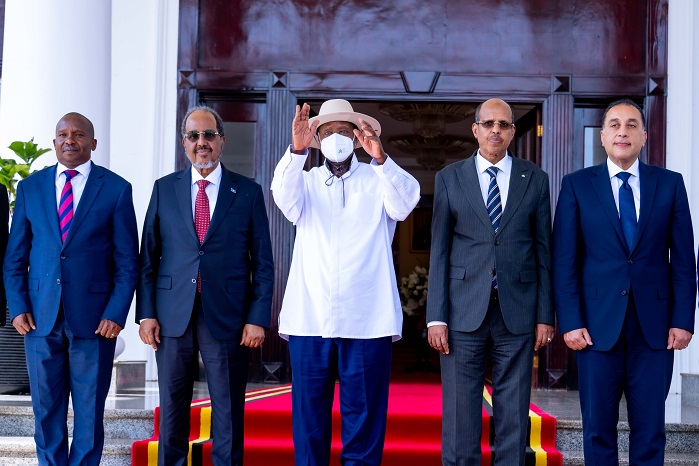
President Museveni with other Heads of States and delegations who attended the Entebbe summit
HABARI DAILY I Kampala, Uganda I President Yoweri Museveni has reiterated the urgent need for African solidarity and increased financial support to Somalia, as a key pillar for sustainable peace and stability in the Horn of Africa.
He made the remarks while chairing the Extraordinary Summit of Troop-Contributing Countries (TCCs) to the African Union Support and Stabilization Mission in Somalia (AUSSOM) at State House, Entebbe.
The summit brought together leaders and representatives from across the African continent to deliberate on the future of Somalia’s security, the transition of the African Union peace mission, and the broader regional efforts to counter terrorism and restore stability.
“We need to assist Somalia to get out of these problems. As you have heard, more money is needed to sustain the stabilization mission,” President Museveni said, urging African states and partners to do more to support Somalia’s peacebuilding efforts.
Reflecting on Africa’s own struggles with dictatorship and instability, President Museveni invoked the spirit of Pan-African solidarity that once aided Uganda during the fight against Idi Amin.
“It is solidarity which helped Africa come to where we are today. When we had a problem with Idi Amin, we were supported by our brothers from Tanzania and Mozambique,” he said.
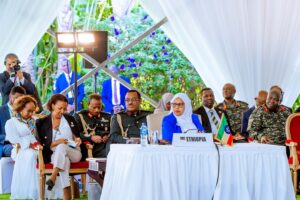
Some of the delegates from Ethiopia, who attended the meeting
Museveni further delved deep into the ideological foundations of Uganda’s post-conflict recovery, development and national unity.
He emphasized the four guiding principles of the National Resistance Movement (NRM): Patriotism, Pan-Africanism, Socio-Economic Transformation, and Democracy.
He cautioned against the politics of identity, sectarianism, and clan divisions, warning that these were dangerous distractions that could derail Africa’s progress.
“If I was to play the politics of identity as a Munyankore, I would first be an enemy of the Banyankore before becoming an enemy of Uganda,” he said, stressing that prosperity in Uganda depends on mutual interdependence among its diverse communities.
Museveni also outlined Uganda’s journey from a failed state between 1966 and 1986 marked by the collapse of state institutions to a stable and functional state anchored on ideological clarity and a people-centered governance model.
He argued that the same formula could be adopted in Somalia and other African countries facing prolonged insecurity.
Commenting on Somalia’s challenges, he criticized the underfunding of the Somali National Army and the African Union mission, describing it as an “underdose” that had prolonged the country’s instability.
“Al-Shabaab is a weak force. If they had a healthy cause and support, they would have overrun Somalia by now. What has prolonged their existence is the small, under-supported Somali army and external forces,” he said.
He proposed the formation of a volunteer-based national army in Somalia, inspired by Uganda’s experience during its liberation struggle.
Museveni recounted how Uganda, with the support of Tanzania and Mozambique, raised an effective force of 9,000 troops from a core of just 28 trained cadres, between December 1978 and April 1979, without the luxury of salaries.
He stressed that victory came from ideological clarity, volunteerism, and commitment to a just cause not merely from funding.
“Somalia and its supporters must stop the under-dosing. We need enough, well-trained and well-equipped Somali soldiers or enough, properly equipped external forces. With adequate funding, Uganda is ready to contribute more troops,” he said.
On his part, Hassan Sheikh Mohamud, the President of the Federal Republic of Somalia acknowledged the critical role Uganda and other African Union troop-contributing countries have played in the fight against terrorism in Somalia.
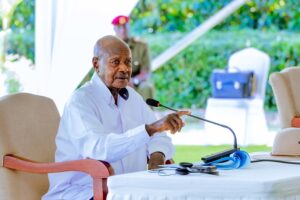
Museveni making a point during the meeting
Mahmoud Ali Youssouf, the Chairperson of the African Union Commission, paid tribute to all troop-contributing countries for their sacrifices in the pursuit of peace in Somalia, honoring those who have lost their lives in the line of duty.
“We salute the bravery of our forces and mourn the heroes who have fallen in the quest for a stable Somalia,” he stated.
Youssouf acknowledged the significant progress made in combating terrorism, particularly against Al-Shabaab, but emphasized that challenges remain.
“While notable strides have been achieved, recent setbacks remind us of the persistent threat posed by terrorist groups. It is imperative that we intensify our efforts to neutralize these threats,” he urged.
The summit was also attended by Abdoulkader Kamil Mohamed, the Prime Minister of the Republic Djibouti, Prof. Kithure Kindiki, the Deputy President of the Republic of Kenya, Dr. Mostafa Madbouly, the Prime Minister of Egypt, Eng. Aisha Mohammed Mussa, the Minister of Defence of the Federal Democratic Republic of Ethiopia, Dr. Workneh Gebeyehu, the Executive Secretary of the Intergovernmental Authority on Development (IGAD), among others.


